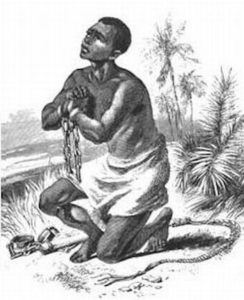
*On this date in 1772, the case of Somerset v Stewart was ruled. This was a British judgment of the Court of King's Bench on labor law and human rights.
It held that chattel slavery was unsupported by the common law in England and Wales, although the position elsewhere in the British Empire was left ambiguous. James Somerset, an enslaved African, was purchased by Charles Stewart, a Customs officer, when he was in Boston, Province of Massachusetts Bay, a British crown colony in North America. Stewart brought Somerset with him when he returned to England in 1769, but in 1771, Somerset escaped.
After he was recaptured in November, Stewart imprisoned him on the ship Ann and Mary (under Captain John Knowles), bound for the British colony of Jamaica. He directed that Somerset be sold to a plantation for labor. Somerset's three godparents from his baptism as a Christian in England, John Marlow, Thomas Walkin, and Elizabeth Cade, made an application on December 3 before the Court of King's Bench for a writ of habeas corpus. On December 9, Captain Knowles produced Somerset before the Court of King's Bench, which had to determine whether his imprisonment was lawful.
Lord Mansfield decided that The state of slavery is of such a nature that it is incapable of being introduced on any reasons, moral or political, but only by positive law [statute], which preserves its force long after the reasons, occasions, and time itself from whence it was created, is erased from memory. It is so odious that nothing can be suffered to support it but positive law. Whatever inconveniences, therefore, may follow from the decision, I cannot say this case is allowed or approved by the law of England, and therefore, the black must be discharged.
Slavery had never been authorized by statute in England and Wales, and Lord Mansfield's decision found it also unsupported in the common law. Lord Mansfield narrowly limited his judgment to the issue of whether a person, regardless of being a slave, could be removed from England against his will and said he could not. The decision was that the property rights of chattel slaves were unsupported by common law.
Some historians believe the case contributed to increasing colonial support for separatism in the Thirteen Colonies of British North America by parties on both sides of the slavery question who wanted to establish independent government and law. The southern colonies wanted to protect slavery and expand their territory dramatically in the decades after independence was won.